An Analysis of Directors' Duties under Corporations Act 2001
VerifiedAdded on 2022/11/30
|9
|2461
|338
Essay
AI Summary
This essay examines the duties of company directors as outlined in the Corporations Act 2001, focusing on the concepts of 'good faith' and 'proper purpose' as defined in section 181. It explores the historical context of these duties, tracing their origins in common law and equitable principles, and analyzes how they have been codified and interpreted in contemporary legal practice. The essay delves into the meaning of 'good faith,' emphasizing the requirement for directors to act honestly and sincerely, and for the benefit of the company as a whole. It also examines the 'proper purpose' doctrine, highlighting the importance of directors using their powers for the intended purposes, and not for personal gain. Furthermore, the essay discusses the role of these duties in facilitating corporate governance, emphasizing the importance of transparency, accountability, and fairness in the relationship between the company and its stakeholders. The essay concludes by underscoring the significance of the Corporations Act in ensuring the effective functioning of companies and the overall economic health of Australia. It highlights the implications of directors' adherence to section 181 for maintaining investor confidence and promoting corporate success.
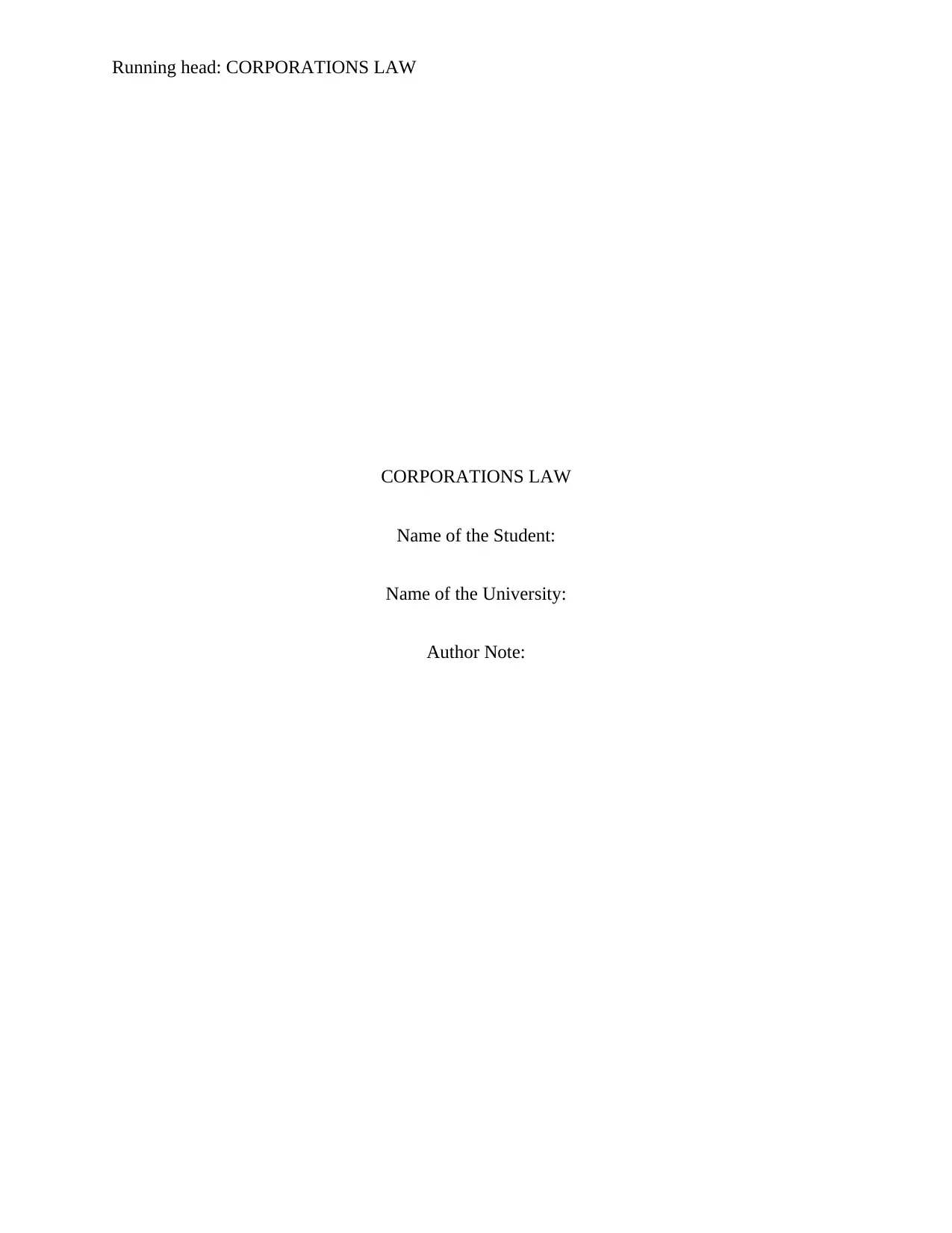
Running head: CORPORATIONS LAW
CORPORATIONS LAW
Name of the Student:
Name of the University:
Author Note:
CORPORATIONS LAW
Name of the Student:
Name of the University:
Author Note:
Paraphrase This Document
Need a fresh take? Get an instant paraphrase of this document with our AI Paraphraser
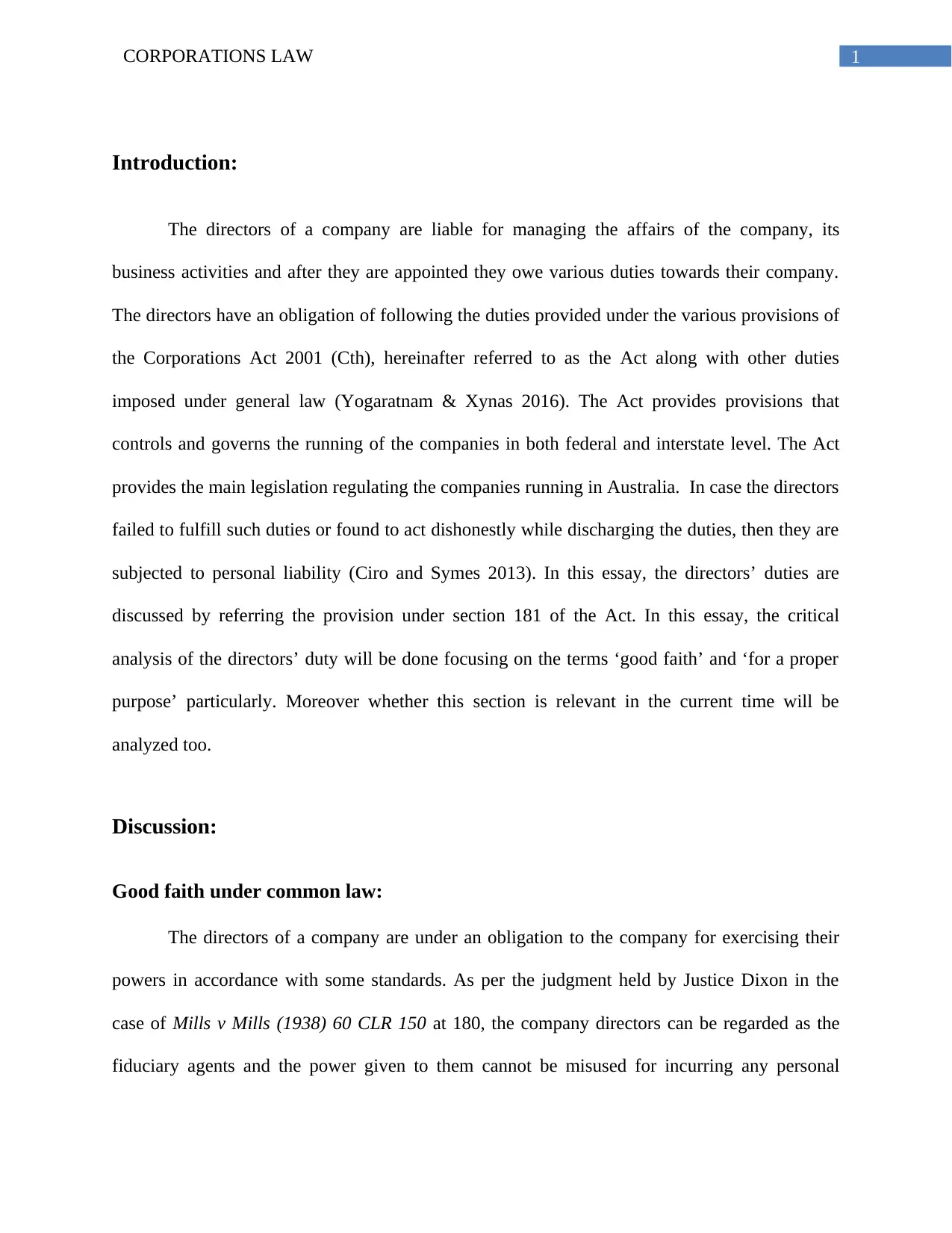
1CORPORATIONS LAW
Introduction:
The directors of a company are liable for managing the affairs of the company, its
business activities and after they are appointed they owe various duties towards their company.
The directors have an obligation of following the duties provided under the various provisions of
the Corporations Act 2001 (Cth), hereinafter referred to as the Act along with other duties
imposed under general law (Yogaratnam & Xynas 2016). The Act provides provisions that
controls and governs the running of the companies in both federal and interstate level. The Act
provides the main legislation regulating the companies running in Australia. In case the directors
failed to fulfill such duties or found to act dishonestly while discharging the duties, then they are
subjected to personal liability (Ciro and Symes 2013). In this essay, the directors’ duties are
discussed by referring the provision under section 181 of the Act. In this essay, the critical
analysis of the directors’ duty will be done focusing on the terms ‘good faith’ and ‘for a proper
purpose’ particularly. Moreover whether this section is relevant in the current time will be
analyzed too.
Discussion:
Good faith under common law:
The directors of a company are under an obligation to the company for exercising their
powers in accordance with some standards. As per the judgment held by Justice Dixon in the
case of Mills v Mills (1938) 60 CLR 150 at 180, the company directors can be regarded as the
fiduciary agents and the power given to them cannot be misused for incurring any personal
Introduction:
The directors of a company are liable for managing the affairs of the company, its
business activities and after they are appointed they owe various duties towards their company.
The directors have an obligation of following the duties provided under the various provisions of
the Corporations Act 2001 (Cth), hereinafter referred to as the Act along with other duties
imposed under general law (Yogaratnam & Xynas 2016). The Act provides provisions that
controls and governs the running of the companies in both federal and interstate level. The Act
provides the main legislation regulating the companies running in Australia. In case the directors
failed to fulfill such duties or found to act dishonestly while discharging the duties, then they are
subjected to personal liability (Ciro and Symes 2013). In this essay, the directors’ duties are
discussed by referring the provision under section 181 of the Act. In this essay, the critical
analysis of the directors’ duty will be done focusing on the terms ‘good faith’ and ‘for a proper
purpose’ particularly. Moreover whether this section is relevant in the current time will be
analyzed too.
Discussion:
Good faith under common law:
The directors of a company are under an obligation to the company for exercising their
powers in accordance with some standards. As per the judgment held by Justice Dixon in the
case of Mills v Mills (1938) 60 CLR 150 at 180, the company directors can be regarded as the
fiduciary agents and the power given to them cannot be misused for incurring any personal
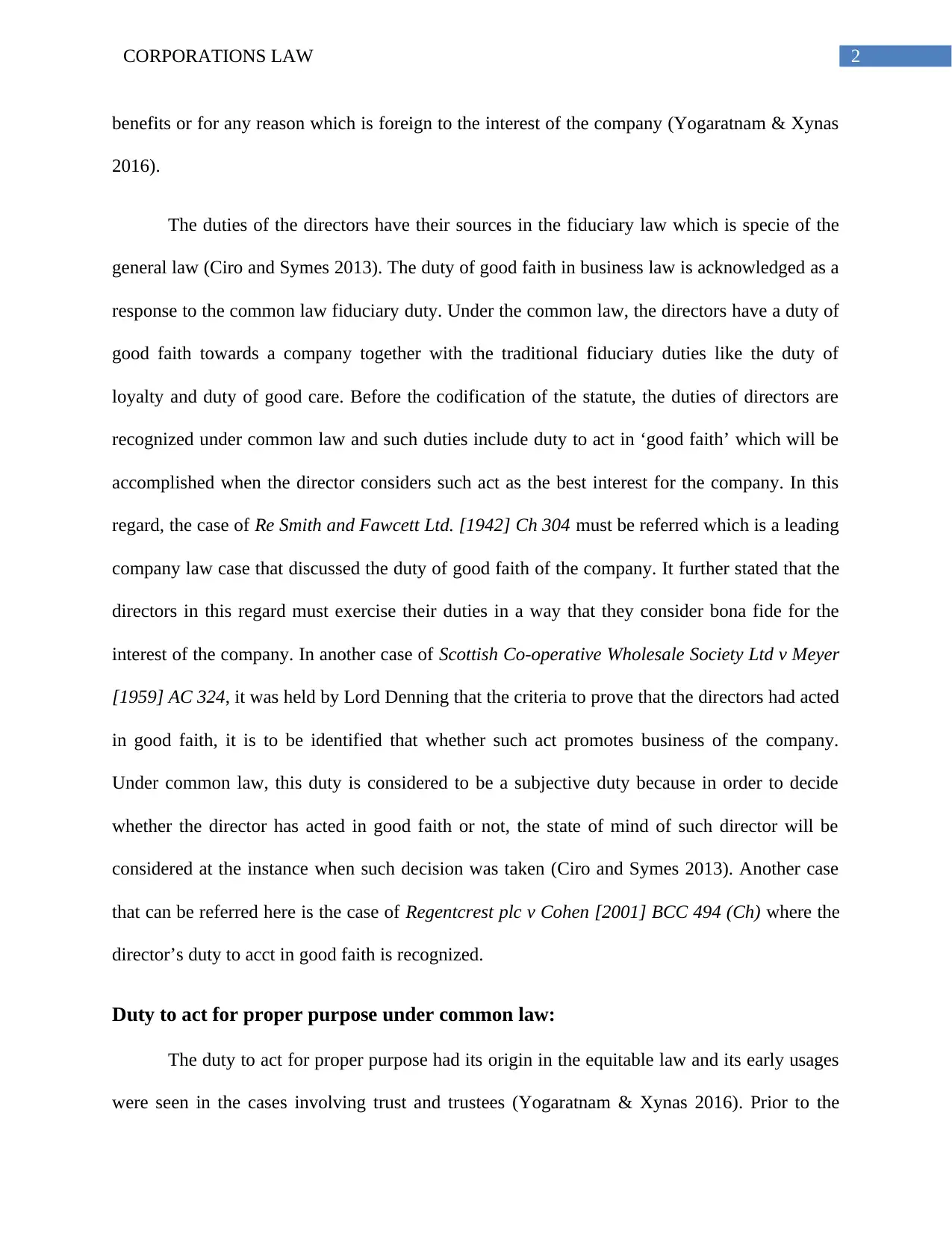
2CORPORATIONS LAW
benefits or for any reason which is foreign to the interest of the company (Yogaratnam & Xynas
2016).
The duties of the directors have their sources in the fiduciary law which is specie of the
general law (Ciro and Symes 2013). The duty of good faith in business law is acknowledged as a
response to the common law fiduciary duty. Under the common law, the directors have a duty of
good faith towards a company together with the traditional fiduciary duties like the duty of
loyalty and duty of good care. Before the codification of the statute, the duties of directors are
recognized under common law and such duties include duty to act in ‘good faith’ which will be
accomplished when the director considers such act as the best interest for the company. In this
regard, the case of Re Smith and Fawcett Ltd. [1942] Ch 304 must be referred which is a leading
company law case that discussed the duty of good faith of the company. It further stated that the
directors in this regard must exercise their duties in a way that they consider bona fide for the
interest of the company. In another case of Scottish Co-operative Wholesale Society Ltd v Meyer
[1959] AC 324, it was held by Lord Denning that the criteria to prove that the directors had acted
in good faith, it is to be identified that whether such act promotes business of the company.
Under common law, this duty is considered to be a subjective duty because in order to decide
whether the director has acted in good faith or not, the state of mind of such director will be
considered at the instance when such decision was taken (Ciro and Symes 2013). Another case
that can be referred here is the case of Regentcrest plc v Cohen [2001] BCC 494 (Ch) where the
director’s duty to acct in good faith is recognized.
Duty to act for proper purpose under common law:
The duty to act for proper purpose had its origin in the equitable law and its early usages
were seen in the cases involving trust and trustees (Yogaratnam & Xynas 2016). Prior to the
benefits or for any reason which is foreign to the interest of the company (Yogaratnam & Xynas
2016).
The duties of the directors have their sources in the fiduciary law which is specie of the
general law (Ciro and Symes 2013). The duty of good faith in business law is acknowledged as a
response to the common law fiduciary duty. Under the common law, the directors have a duty of
good faith towards a company together with the traditional fiduciary duties like the duty of
loyalty and duty of good care. Before the codification of the statute, the duties of directors are
recognized under common law and such duties include duty to act in ‘good faith’ which will be
accomplished when the director considers such act as the best interest for the company. In this
regard, the case of Re Smith and Fawcett Ltd. [1942] Ch 304 must be referred which is a leading
company law case that discussed the duty of good faith of the company. It further stated that the
directors in this regard must exercise their duties in a way that they consider bona fide for the
interest of the company. In another case of Scottish Co-operative Wholesale Society Ltd v Meyer
[1959] AC 324, it was held by Lord Denning that the criteria to prove that the directors had acted
in good faith, it is to be identified that whether such act promotes business of the company.
Under common law, this duty is considered to be a subjective duty because in order to decide
whether the director has acted in good faith or not, the state of mind of such director will be
considered at the instance when such decision was taken (Ciro and Symes 2013). Another case
that can be referred here is the case of Regentcrest plc v Cohen [2001] BCC 494 (Ch) where the
director’s duty to acct in good faith is recognized.
Duty to act for proper purpose under common law:
The duty to act for proper purpose had its origin in the equitable law and its early usages
were seen in the cases involving trust and trustees (Yogaratnam & Xynas 2016). Prior to the
⊘ This is a preview!⊘
Do you want full access?
Subscribe today to unlock all pages.

Trusted by 1+ million students worldwide
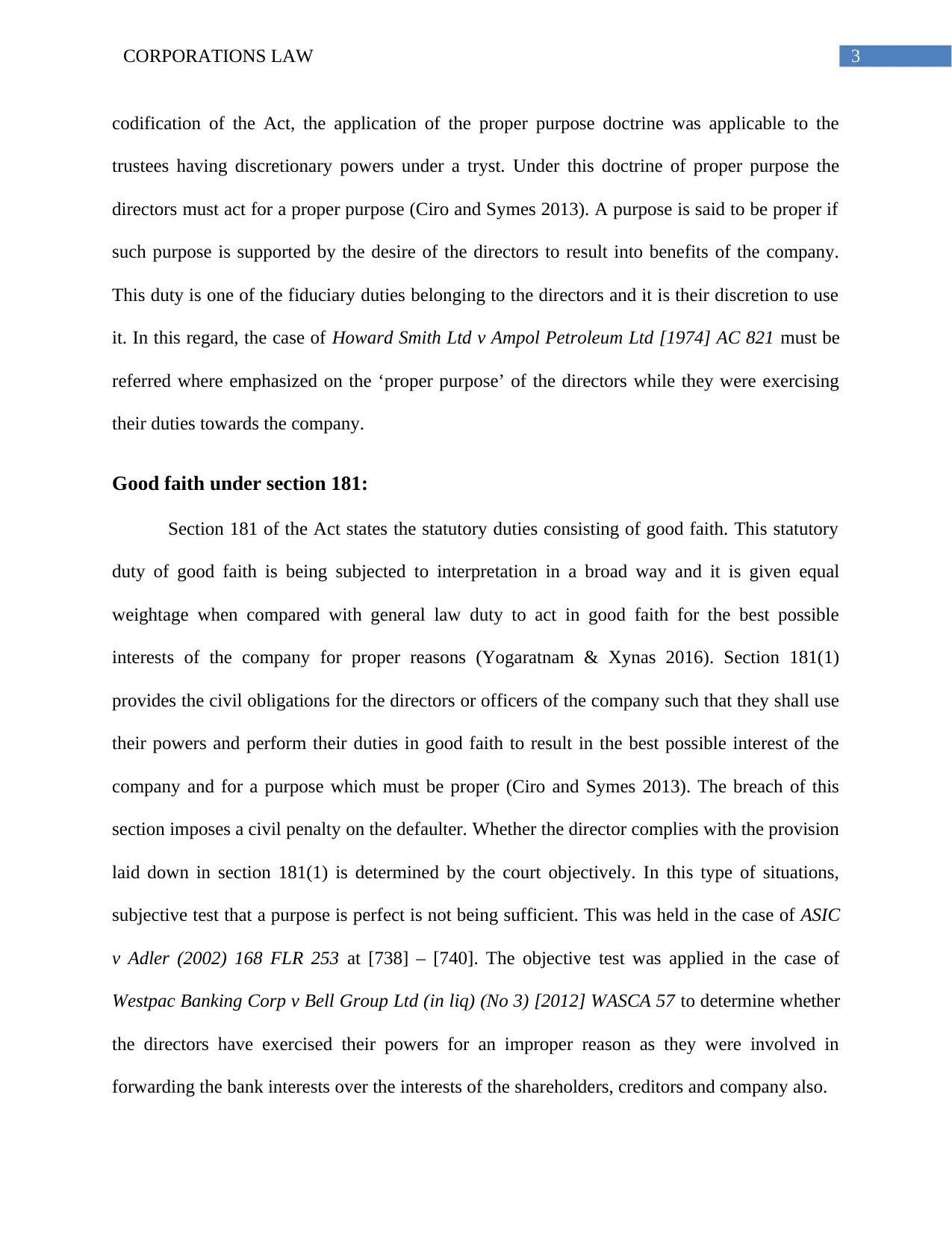
3CORPORATIONS LAW
codification of the Act, the application of the proper purpose doctrine was applicable to the
trustees having discretionary powers under a tryst. Under this doctrine of proper purpose the
directors must act for a proper purpose (Ciro and Symes 2013). A purpose is said to be proper if
such purpose is supported by the desire of the directors to result into benefits of the company.
This duty is one of the fiduciary duties belonging to the directors and it is their discretion to use
it. In this regard, the case of Howard Smith Ltd v Ampol Petroleum Ltd [1974] AC 821 must be
referred where emphasized on the ‘proper purpose’ of the directors while they were exercising
their duties towards the company.
Good faith under section 181:
Section 181 of the Act states the statutory duties consisting of good faith. This statutory
duty of good faith is being subjected to interpretation in a broad way and it is given equal
weightage when compared with general law duty to act in good faith for the best possible
interests of the company for proper reasons (Yogaratnam & Xynas 2016). Section 181(1)
provides the civil obligations for the directors or officers of the company such that they shall use
their powers and perform their duties in good faith to result in the best possible interest of the
company and for a purpose which must be proper (Ciro and Symes 2013). The breach of this
section imposes a civil penalty on the defaulter. Whether the director complies with the provision
laid down in section 181(1) is determined by the court objectively. In this type of situations,
subjective test that a purpose is perfect is not being sufficient. This was held in the case of ASIC
v Adler (2002) 168 FLR 253 at [738] – [740]. The objective test was applied in the case of
Westpac Banking Corp v Bell Group Ltd (in liq) (No 3) [2012] WASCA 57 to determine whether
the directors have exercised their powers for an improper reason as they were involved in
forwarding the bank interests over the interests of the shareholders, creditors and company also.
codification of the Act, the application of the proper purpose doctrine was applicable to the
trustees having discretionary powers under a tryst. Under this doctrine of proper purpose the
directors must act for a proper purpose (Ciro and Symes 2013). A purpose is said to be proper if
such purpose is supported by the desire of the directors to result into benefits of the company.
This duty is one of the fiduciary duties belonging to the directors and it is their discretion to use
it. In this regard, the case of Howard Smith Ltd v Ampol Petroleum Ltd [1974] AC 821 must be
referred where emphasized on the ‘proper purpose’ of the directors while they were exercising
their duties towards the company.
Good faith under section 181:
Section 181 of the Act states the statutory duties consisting of good faith. This statutory
duty of good faith is being subjected to interpretation in a broad way and it is given equal
weightage when compared with general law duty to act in good faith for the best possible
interests of the company for proper reasons (Yogaratnam & Xynas 2016). Section 181(1)
provides the civil obligations for the directors or officers of the company such that they shall use
their powers and perform their duties in good faith to result in the best possible interest of the
company and for a purpose which must be proper (Ciro and Symes 2013). The breach of this
section imposes a civil penalty on the defaulter. Whether the director complies with the provision
laid down in section 181(1) is determined by the court objectively. In this type of situations,
subjective test that a purpose is perfect is not being sufficient. This was held in the case of ASIC
v Adler (2002) 168 FLR 253 at [738] – [740]. The objective test was applied in the case of
Westpac Banking Corp v Bell Group Ltd (in liq) (No 3) [2012] WASCA 57 to determine whether
the directors have exercised their powers for an improper reason as they were involved in
forwarding the bank interests over the interests of the shareholders, creditors and company also.
Paraphrase This Document
Need a fresh take? Get an instant paraphrase of this document with our AI Paraphraser
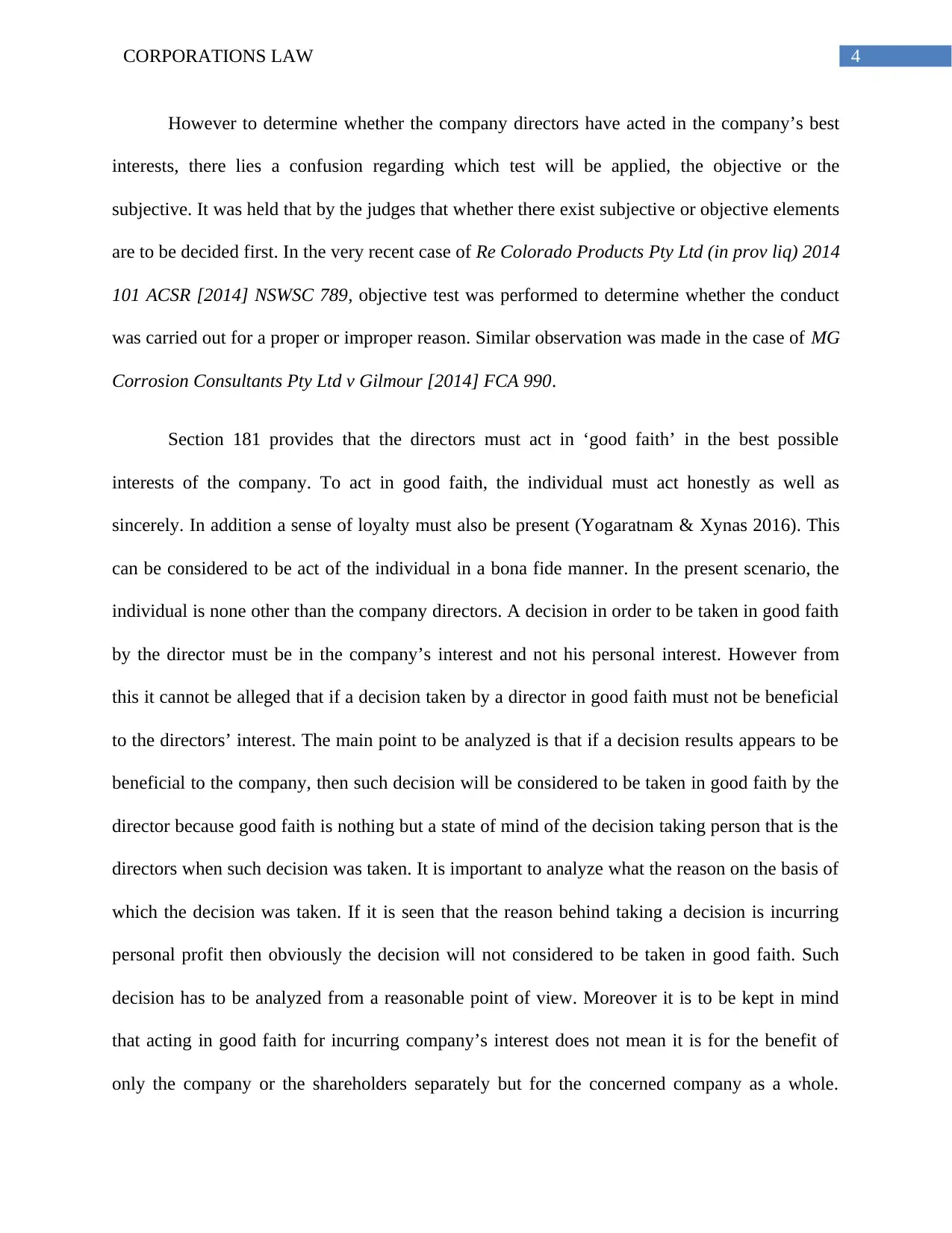
4CORPORATIONS LAW
However to determine whether the company directors have acted in the company’s best
interests, there lies a confusion regarding which test will be applied, the objective or the
subjective. It was held that by the judges that whether there exist subjective or objective elements
are to be decided first. In the very recent case of Re Colorado Products Pty Ltd (in prov liq) 2014
101 ACSR [2014] NSWSC 789, objective test was performed to determine whether the conduct
was carried out for a proper or improper reason. Similar observation was made in the case of MG
Corrosion Consultants Pty Ltd v Gilmour [2014] FCA 990.
Section 181 provides that the directors must act in ‘good faith’ in the best possible
interests of the company. To act in good faith, the individual must act honestly as well as
sincerely. In addition a sense of loyalty must also be present (Yogaratnam & Xynas 2016). This
can be considered to be act of the individual in a bona fide manner. In the present scenario, the
individual is none other than the company directors. A decision in order to be taken in good faith
by the director must be in the company’s interest and not his personal interest. However from
this it cannot be alleged that if a decision taken by a director in good faith must not be beneficial
to the directors’ interest. The main point to be analyzed is that if a decision results appears to be
beneficial to the company, then such decision will be considered to be taken in good faith by the
director because good faith is nothing but a state of mind of the decision taking person that is the
directors when such decision was taken. It is important to analyze what the reason on the basis of
which the decision was taken. If it is seen that the reason behind taking a decision is incurring
personal profit then obviously the decision will not considered to be taken in good faith. Such
decision has to be analyzed from a reasonable point of view. Moreover it is to be kept in mind
that acting in good faith for incurring company’s interest does not mean it is for the benefit of
only the company or the shareholders separately but for the concerned company as a whole.
However to determine whether the company directors have acted in the company’s best
interests, there lies a confusion regarding which test will be applied, the objective or the
subjective. It was held that by the judges that whether there exist subjective or objective elements
are to be decided first. In the very recent case of Re Colorado Products Pty Ltd (in prov liq) 2014
101 ACSR [2014] NSWSC 789, objective test was performed to determine whether the conduct
was carried out for a proper or improper reason. Similar observation was made in the case of MG
Corrosion Consultants Pty Ltd v Gilmour [2014] FCA 990.
Section 181 provides that the directors must act in ‘good faith’ in the best possible
interests of the company. To act in good faith, the individual must act honestly as well as
sincerely. In addition a sense of loyalty must also be present (Yogaratnam & Xynas 2016). This
can be considered to be act of the individual in a bona fide manner. In the present scenario, the
individual is none other than the company directors. A decision in order to be taken in good faith
by the director must be in the company’s interest and not his personal interest. However from
this it cannot be alleged that if a decision taken by a director in good faith must not be beneficial
to the directors’ interest. The main point to be analyzed is that if a decision results appears to be
beneficial to the company, then such decision will be considered to be taken in good faith by the
director because good faith is nothing but a state of mind of the decision taking person that is the
directors when such decision was taken. It is important to analyze what the reason on the basis of
which the decision was taken. If it is seen that the reason behind taking a decision is incurring
personal profit then obviously the decision will not considered to be taken in good faith. Such
decision has to be analyzed from a reasonable point of view. Moreover it is to be kept in mind
that acting in good faith for incurring company’s interest does not mean it is for the benefit of
only the company or the shareholders separately but for the concerned company as a whole.
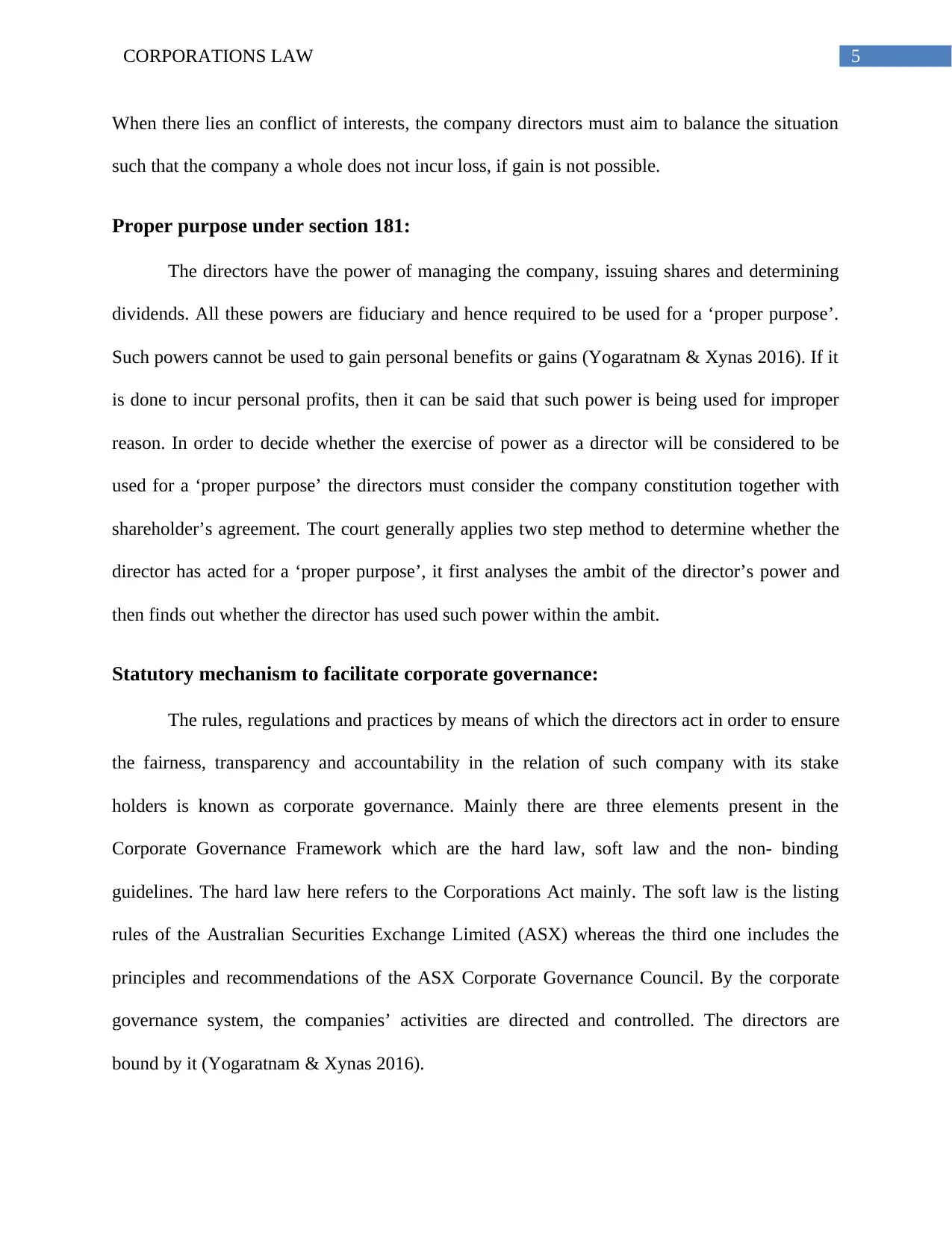
5CORPORATIONS LAW
When there lies an conflict of interests, the company directors must aim to balance the situation
such that the company a whole does not incur loss, if gain is not possible.
Proper purpose under section 181:
The directors have the power of managing the company, issuing shares and determining
dividends. All these powers are fiduciary and hence required to be used for a ‘proper purpose’.
Such powers cannot be used to gain personal benefits or gains (Yogaratnam & Xynas 2016). If it
is done to incur personal profits, then it can be said that such power is being used for improper
reason. In order to decide whether the exercise of power as a director will be considered to be
used for a ‘proper purpose’ the directors must consider the company constitution together with
shareholder’s agreement. The court generally applies two step method to determine whether the
director has acted for a ‘proper purpose’, it first analyses the ambit of the director’s power and
then finds out whether the director has used such power within the ambit.
Statutory mechanism to facilitate corporate governance:
The rules, regulations and practices by means of which the directors act in order to ensure
the fairness, transparency and accountability in the relation of such company with its stake
holders is known as corporate governance. Mainly there are three elements present in the
Corporate Governance Framework which are the hard law, soft law and the non- binding
guidelines. The hard law here refers to the Corporations Act mainly. The soft law is the listing
rules of the Australian Securities Exchange Limited (ASX) whereas the third one includes the
principles and recommendations of the ASX Corporate Governance Council. By the corporate
governance system, the companies’ activities are directed and controlled. The directors are
bound by it (Yogaratnam & Xynas 2016).
When there lies an conflict of interests, the company directors must aim to balance the situation
such that the company a whole does not incur loss, if gain is not possible.
Proper purpose under section 181:
The directors have the power of managing the company, issuing shares and determining
dividends. All these powers are fiduciary and hence required to be used for a ‘proper purpose’.
Such powers cannot be used to gain personal benefits or gains (Yogaratnam & Xynas 2016). If it
is done to incur personal profits, then it can be said that such power is being used for improper
reason. In order to decide whether the exercise of power as a director will be considered to be
used for a ‘proper purpose’ the directors must consider the company constitution together with
shareholder’s agreement. The court generally applies two step method to determine whether the
director has acted for a ‘proper purpose’, it first analyses the ambit of the director’s power and
then finds out whether the director has used such power within the ambit.
Statutory mechanism to facilitate corporate governance:
The rules, regulations and practices by means of which the directors act in order to ensure
the fairness, transparency and accountability in the relation of such company with its stake
holders is known as corporate governance. Mainly there are three elements present in the
Corporate Governance Framework which are the hard law, soft law and the non- binding
guidelines. The hard law here refers to the Corporations Act mainly. The soft law is the listing
rules of the Australian Securities Exchange Limited (ASX) whereas the third one includes the
principles and recommendations of the ASX Corporate Governance Council. By the corporate
governance system, the companies’ activities are directed and controlled. The directors are
bound by it (Yogaratnam & Xynas 2016).
⊘ This is a preview!⊘
Do you want full access?
Subscribe today to unlock all pages.

Trusted by 1+ million students worldwide
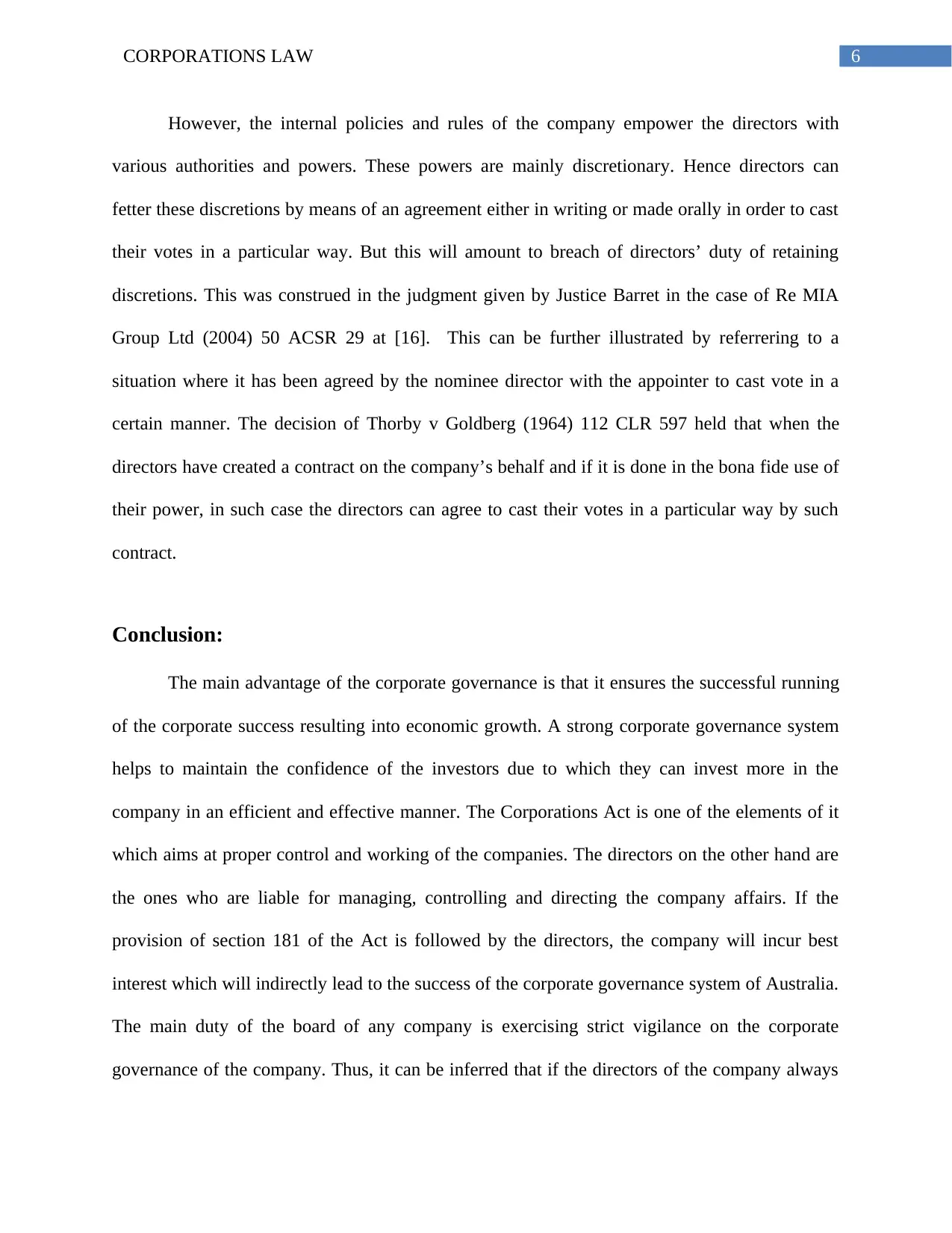
6CORPORATIONS LAW
However, the internal policies and rules of the company empower the directors with
various authorities and powers. These powers are mainly discretionary. Hence directors can
fetter these discretions by means of an agreement either in writing or made orally in order to cast
their votes in a particular way. But this will amount to breach of directors’ duty of retaining
discretions. This was construed in the judgment given by Justice Barret in the case of Re MIA
Group Ltd (2004) 50 ACSR 29 at [16]. This can be further illustrated by referrering to a
situation where it has been agreed by the nominee director with the appointer to cast vote in a
certain manner. The decision of Thorby v Goldberg (1964) 112 CLR 597 held that when the
directors have created a contract on the company’s behalf and if it is done in the bona fide use of
their power, in such case the directors can agree to cast their votes in a particular way by such
contract.
Conclusion:
The main advantage of the corporate governance is that it ensures the successful running
of the corporate success resulting into economic growth. A strong corporate governance system
helps to maintain the confidence of the investors due to which they can invest more in the
company in an efficient and effective manner. The Corporations Act is one of the elements of it
which aims at proper control and working of the companies. The directors on the other hand are
the ones who are liable for managing, controlling and directing the company affairs. If the
provision of section 181 of the Act is followed by the directors, the company will incur best
interest which will indirectly lead to the success of the corporate governance system of Australia.
The main duty of the board of any company is exercising strict vigilance on the corporate
governance of the company. Thus, it can be inferred that if the directors of the company always
However, the internal policies and rules of the company empower the directors with
various authorities and powers. These powers are mainly discretionary. Hence directors can
fetter these discretions by means of an agreement either in writing or made orally in order to cast
their votes in a particular way. But this will amount to breach of directors’ duty of retaining
discretions. This was construed in the judgment given by Justice Barret in the case of Re MIA
Group Ltd (2004) 50 ACSR 29 at [16]. This can be further illustrated by referrering to a
situation where it has been agreed by the nominee director with the appointer to cast vote in a
certain manner. The decision of Thorby v Goldberg (1964) 112 CLR 597 held that when the
directors have created a contract on the company’s behalf and if it is done in the bona fide use of
their power, in such case the directors can agree to cast their votes in a particular way by such
contract.
Conclusion:
The main advantage of the corporate governance is that it ensures the successful running
of the corporate success resulting into economic growth. A strong corporate governance system
helps to maintain the confidence of the investors due to which they can invest more in the
company in an efficient and effective manner. The Corporations Act is one of the elements of it
which aims at proper control and working of the companies. The directors on the other hand are
the ones who are liable for managing, controlling and directing the company affairs. If the
provision of section 181 of the Act is followed by the directors, the company will incur best
interest which will indirectly lead to the success of the corporate governance system of Australia.
The main duty of the board of any company is exercising strict vigilance on the corporate
governance of the company. Thus, it can be inferred that if the directors of the company always
Paraphrase This Document
Need a fresh take? Get an instant paraphrase of this document with our AI Paraphraser
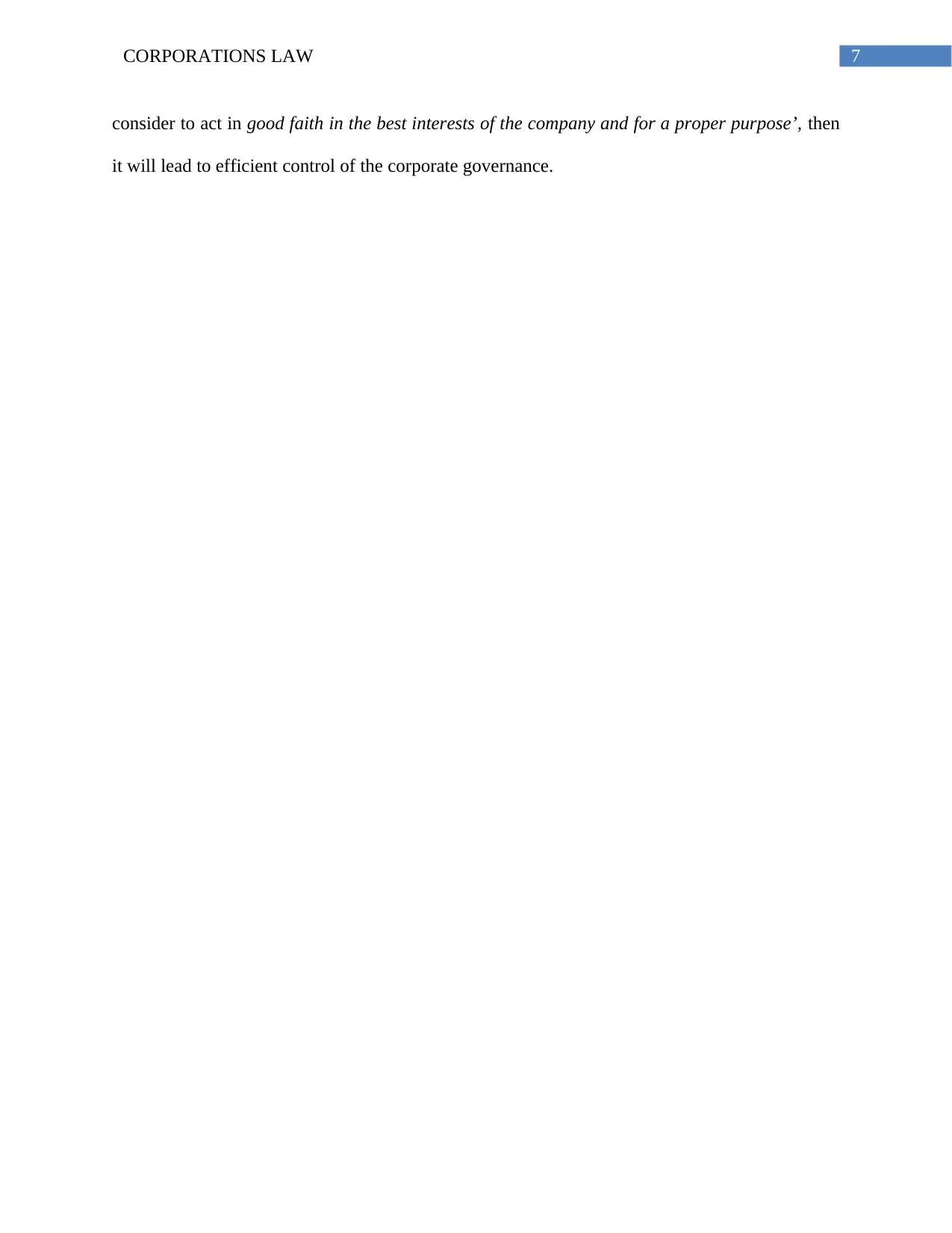
7CORPORATIONS LAW
consider to act in good faith in the best interests of the company and for a proper purpose’, then
it will lead to efficient control of the corporate governance.
consider to act in good faith in the best interests of the company and for a proper purpose’, then
it will lead to efficient control of the corporate governance.
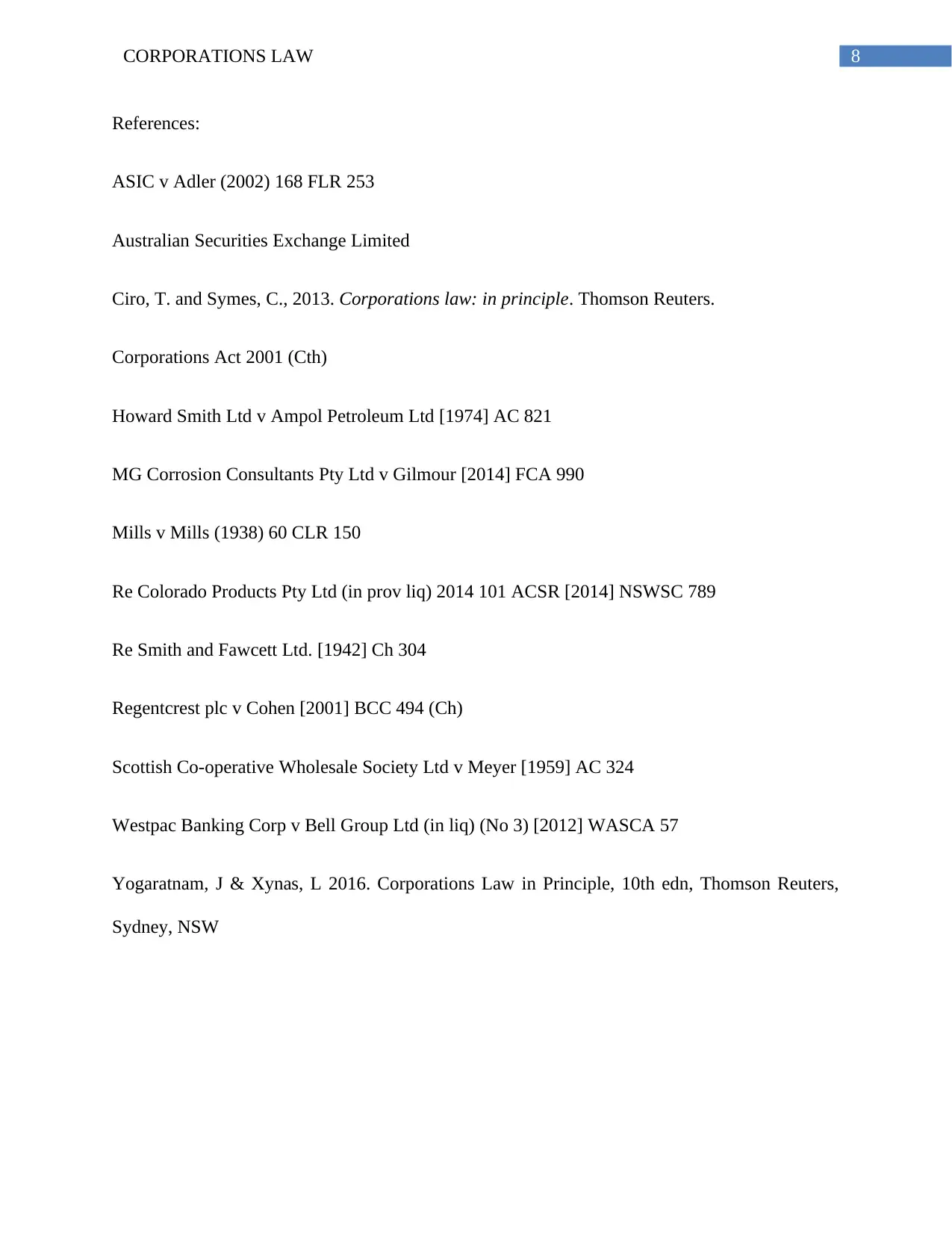
8CORPORATIONS LAW
References:
ASIC v Adler (2002) 168 FLR 253
Australian Securities Exchange Limited
Ciro, T. and Symes, C., 2013. Corporations law: in principle. Thomson Reuters.
Corporations Act 2001 (Cth)
Howard Smith Ltd v Ampol Petroleum Ltd [1974] AC 821
MG Corrosion Consultants Pty Ltd v Gilmour [2014] FCA 990
Mills v Mills (1938) 60 CLR 150
Re Colorado Products Pty Ltd (in prov liq) 2014 101 ACSR [2014] NSWSC 789
Re Smith and Fawcett Ltd. [1942] Ch 304
Regentcrest plc v Cohen [2001] BCC 494 (Ch)
Scottish Co-operative Wholesale Society Ltd v Meyer [1959] AC 324
Westpac Banking Corp v Bell Group Ltd (in liq) (No 3) [2012] WASCA 57
Yogaratnam, J & Xynas, L 2016. Corporations Law in Principle, 10th edn, Thomson Reuters,
Sydney, NSW
References:
ASIC v Adler (2002) 168 FLR 253
Australian Securities Exchange Limited
Ciro, T. and Symes, C., 2013. Corporations law: in principle. Thomson Reuters.
Corporations Act 2001 (Cth)
Howard Smith Ltd v Ampol Petroleum Ltd [1974] AC 821
MG Corrosion Consultants Pty Ltd v Gilmour [2014] FCA 990
Mills v Mills (1938) 60 CLR 150
Re Colorado Products Pty Ltd (in prov liq) 2014 101 ACSR [2014] NSWSC 789
Re Smith and Fawcett Ltd. [1942] Ch 304
Regentcrest plc v Cohen [2001] BCC 494 (Ch)
Scottish Co-operative Wholesale Society Ltd v Meyer [1959] AC 324
Westpac Banking Corp v Bell Group Ltd (in liq) (No 3) [2012] WASCA 57
Yogaratnam, J & Xynas, L 2016. Corporations Law in Principle, 10th edn, Thomson Reuters,
Sydney, NSW
⊘ This is a preview!⊘
Do you want full access?
Subscribe today to unlock all pages.

Trusted by 1+ million students worldwide
1 out of 9
Related Documents
Your All-in-One AI-Powered Toolkit for Academic Success.
+13062052269
info@desklib.com
Available 24*7 on WhatsApp / Email
![[object Object]](/_next/static/media/star-bottom.7253800d.svg)
Unlock your academic potential
Copyright © 2020–2026 A2Z Services. All Rights Reserved. Developed and managed by ZUCOL.





